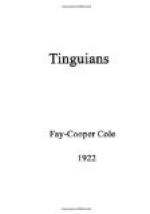At the command of the medium, four or five men begin to play on copper gongs, while the wife of the host comes forward and receives the spear and rooster in one hand. The medium takes the head-axe, and then the two women take hold of the winnower with their free hands. Keeping time to the music, they lift it from the mortar, take one step, then stop, strike the spear and head-axe together, then step and stop again. At each halt the medium takes a little of the rice and blood from the winnower and sprinkles it on the ground for the spirits to eat. [144] When they have made half the circuit of the mortar, they change places and retrace their steps; for “as they take the gifts partly away and then replace them, in the same manner the spirits will return that part of the patient’s life which they had removed, and he will become well and strong again.”
The blood and rice which remain after this dance is placed on nine pieces of banana bark. Five of these are carried to the pala-an; one to the east and one to the west gate of the town; one is put on the talagan, a miniature seat erected near by for the convenience of visiting spirits, and one in a little spirit house known as tangpap (cf.p.311). For an hour or more, the medium makes dawak, and summons many spirits into her body. When the last of superior beings has made his call, the medium goes to her home, carrying her payment for the day’s work, [145] but the townspeople remain to drink basi and to sing da-eng until well into the night.
Early the next morning, the medium goes to the house, and removing the jars and the bundle of decorated rice from the tabing, carries them to the family’s rice granary, and places them in the center of that structure, covering them with six bundles of rice. This is an offering to the spirit residing there, and for the next five days the granary must not be opened.
Nothing more of importance takes place during the morning, but late in the afternoon the people assemble in the dwelling to drink basi, while one or more mediums summon the spirits. After a time a sterile female pig is brought in and placed in the center of the room. Two men armed with long knives slice the animal open along the length of its stomach. An old man quickly slips in his hand, draws out the still palpitating heart, and hands it to a medium, who in turn strokes the stomachs of members of the family, thus protecting them from intestinal troubles. She also touches the guests and the articles which have been used during the day. For this second day this medium receives, as pay, the head and two legs of the pig, a hundred fathoms of thread, a dish of broken rice, and five bundles of unthreshed rice. She also is given a small present in exchange for each bead she received when the spirits entered her body.
Following the ceremony, the members of the family are barred from work, usually for one moon, and during this period they may not eat of wild pig or carabao, of lobsters or eels. An infraction of this rule would incur, the wrath of the spirits and result in sickness and disaster.




